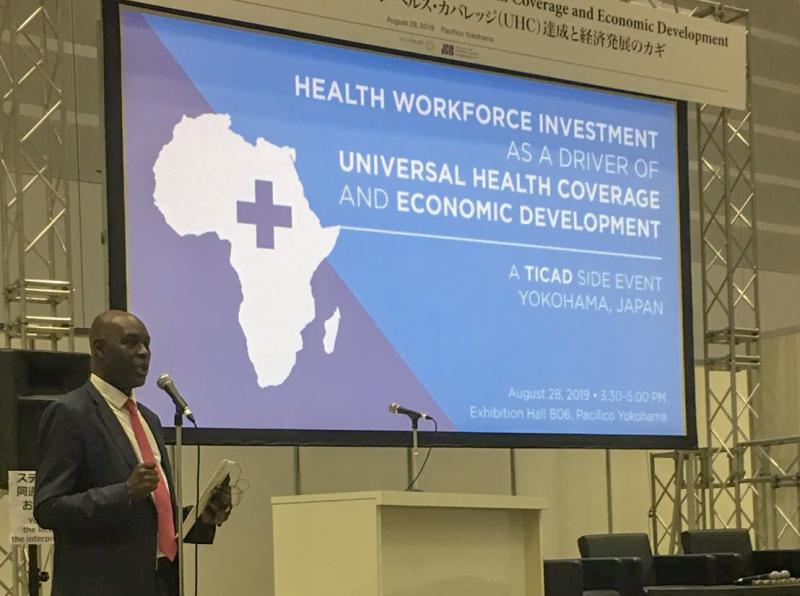Where We Work
See our interactive map


President and CEO Pape Gaye takes the floor at a TICAD side event sponsored by IntraHealth International and Japan Center for International Exchange.
At the 7th Tokyo International Conference on African Development (TICAD) last month, IntraHealth International and Japan Center for International Exchange convened policy experts, ministry of health officials, and representatives from the World Health Organization and Japanese government to lay out a case for greater investment in the health workforce.
On the heels of the G20 and G7 summits, where health ministers acknowledged that primary health care is the bedrock of universal health coverage (UHC), TICAD fostered frank discussions on what’s keeping us from achieving UHC if lack of resources and know-how aren’t the issues.
Dr. Francis Omaswa, who spoke at a TICAD side event hosted by IntraHealth and Japan Center for International Exchange, said that education and training are the best investments to create a global pool of health workers and called for strategy in financing.
“No organization should get money from Japan if they don’t have a system to support the health workforce,” he said. “Everything should be proofed for health workforce, health workforce in all policies.”
Japan has been at the forefront of the movement for UHC for three decades, and the nation's human security concept emphasizes achieving the Sustainable Development Goals (SDGs) to build a safer world. This requires reinforcing primary health care to build more resilient health systems—including, according to the 2019 Yokohama Declaration, sustainable domestic health financing through enhanced collaboration between health and finance authorities to increase domestic resources for health.
The Government of Japan committed to strengthening national and regional capacity for preparedness, early warning and rapid response to health emergencies and any epidemic outbreaks, including through research and development in accordance with the principle of prevention.
But “it’s not realistic that the public sector alone should be charged with making the health system better,” said Pape Gaye, IntraHealth’s president and CEO. “Imagine how fast we can go if we can leverage the know-how and management skills that exist in the private sector.” This message was paired with a commitment from Japanese prime minister Shinzo Abe during TICAD, who promised $20 billion in private-sector investment in Africa over the course of three years.
The Afya Elimu fund represents an ideal example of strategic investment. The student loan program for midlevel health professional students like clinical officers, medical records assistants, lab technicians, nutritionists, and pharmacy technicians in Kenya is a sustainable mechanism for educating the future health workforce—and for making progress on UHC. “Primary health care occurs here,” said Janet Muriuki, deputy chief of party for IntraHealth’s HRH Kenya project. “This is where we want to deliver UHC—and we’re lacking health workers in these places.”
Dr. Omaswa urged that we can't rest until these people are given the skills that they need.
“The people who are providing health services at the community are not always physicians, nurses, or midwives,” he said. “They are allied health workers, community health workers and volunteers, pharmacy assistants.”



